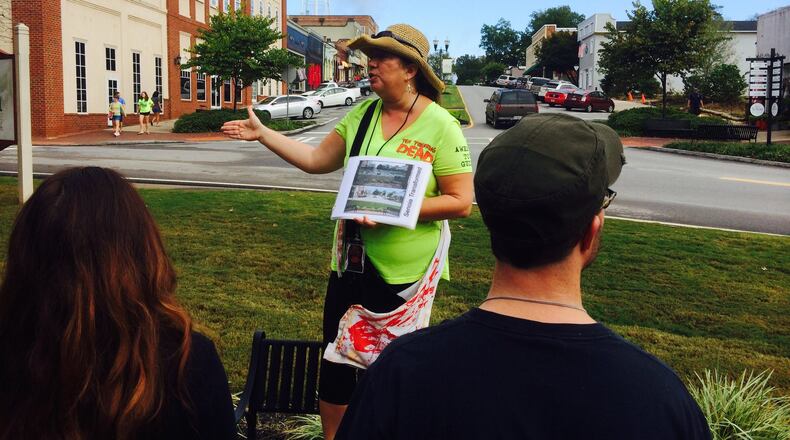Related coverage:
Find Matt on Facebook (https://www.facebook.com/mattkempnercolumnist) and Twitter (@MattKempner) or email him at mkempner@ajc.com.
The mayor of Senoia, Ga., where much of The Walking Dead is filmed, watched Sunday’s season premiere with a couple friends who are hard-bitten fans of the zombie show.
Then came the episode’s shockingly gruesome and dark scenes.
One friend felt nauseous, Mayor Larry Owens told me. The other told the mayor, “I don’t know if I’m going to watch this show any more.”
Others shared the same kind of sentiment on social media. Owens, who told me the show has never been “his cup of tea,” is betting his friends will keep watching. But the pushback highlights an irrefutable truth for what may be the hottest production in Georgia’s booming TV and film industry: Sooner or later, The Walking Dead is going to get killed.
Let’s hope little Senoia is as prepped as the mayor claims it is for the end of the apocalypse.
Rotting flesh has been very good for the town of 4,000 where the recruiting slogan is "The perfect setting. For life." Fans travel 30 miles south from Hartsfield-Jackson International Airport to fill local tour groups. They pack local restaurants during the heat of filming.
On a Caribbean cruise I met folks from Germany who brightened as soon as they heard I live in Georgia. They were planning a vacation to see the setting for the show’s fictional towns of Woodbury and Alexandria, both of which are in Senoia.
But Owens assured me, “We are going to be fine after The Walking Dead leaves.”
“There’s a lot of things in the works,” he said. “None of which I can talk about.”
He hinted that he knows of industrial prospects and ideas for commercial ventures. Plus, he said, other movie and film productions are likely, though probably not on the scale of The Walking Dead. The series, based at a local studio, is in production from May through November and often filming in and around Senoia.
Serving up tax breaks
Georgia dishes out some of the nation’s most lucrative tax breaks and that has bought the state a stream of TV and film productions.
It’s exciting stuff, and it has attracted movie jobs and fed spending at everything from hardware stores to new movie businesses. But it’s set on a wobbly foundation that relies on winning a tax-break arms race to keep a notoriously transient industry in place.
The Walking Dead is a juggernaut unlike most of the 245 TV and movie productions shot in Georgia in the last year. It is the top-rated scripted show on cable. It’s lasted for years. It has a growing international audience. And it inspires Walker Stalker fans to visit.
The show isn’t likely to die off anytime soon, said Scott Tigchelaar, a part owner of Senoia-based Riverwood Studios (also known as Raleigh Studios Atlanta), where the production is based.
“The Walking Dead could lose 80 percent of its viewership, and it would be worth picking the show up,” he said. “It would still make it a strong cable series.”
The AMC network recently announced it will carry the show for an eighth season and the network’s president said The Walking Dead could continue to run for “many, many more years,” according to entertainment industry news site The Wrap.
Of course, that doesn’t mean any of the shooting will remain in Senoia.
But Tigchelaar, who partially built (and lives in) a local housing development now used as the show’s walled city of Alexandria, said “I know they have intentions to continue to use Alexandria as a set in season eight.”
And with the show pulling in brand new viewers in other countries, he speculated Senoia could be primed for tourism for another 15 years.
Cycles of success
Movie productions don’t guarantee local success. Riverwood Studio has been in Senoia since 1989 and in the early 90s it served the production of the movie “Fried Green Tomatoes,” which I’m told still attracts visitors.
But Tigchelaar often talks about how by 2005 much of downtown Senoia was boarded up, with a handful of businesses still in operation. A company he and his brother-in-law Brian Jagt own bought 22 vacant properties and began erecting historic-looking buildings. Other property owners rehabbed their own properties.
Now, I’m told, there are more than 50 businesses in the tiny downtown, most of which don’t have a zombie theme. Beyond movies, the area got economic love from the expansion of metro Atlanta and residents of nearby Peachtree City attracted to the quaint, revitalized downtown.
The Walking Dead was just gasoline on the fire, Tigchelaar likes to say. “It helps the town become a self-sustaining success in its own right.”
A few months ago, he and his brother-in-law joined four members of The Walking Dead production, including executive producer Greg Nicotero and actor Norman Reedus (who plays the role of "Daryl") to launch a new restaurant called Nic and Norman's.
In the fleeting world of fame, it seems like a gamble. But, then every new restaurant is a gamble.
“Long after The Walking Dead is gone,” Tigchelaar told me, “I think it is going to be a great dining destination.”
The top photo on the restaurant’s website is a skewer jabbed through two slabs of red steak. Best not to picture that right after watching the show.
About the Author






